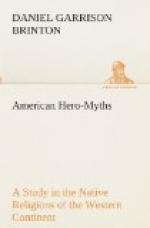[Footnote 1: Clements R. Markham, Journal of the Royal Geographical Society, 1871, p. 291. Pacarina is the present participle of pacarini, to dawn, to begin, to be born.]
[Footnote 2: Informacion, etc., p. 209.]
We are compelled, therefore, by the best evidence now attainable, to adopt the conclusion that the Inca religion, in its purity, deserved the name of monotheism. The statements of the natives and the terms of their religious language unite in confirming this opinion.
It is not right to depreciate the force of these facts simply because we have made up our minds that a people in the intellectual stage of the Peruvians could not have mounted to such a pure air of religion. A prejudgment of this kind is unworthy of a scientific mind. The evidence is complete that the terms I have quoted did belong to the religious language of ancient Peru. They express the conception of divinity which the thinkers of that people had formed. And whether it is thought to be in keeping or not with the rest of their development, it is our bounden duty to accept it, and explain it as best we can. Other instances might be quoted, from the religious history of the old world, where a nation’s insight into the attributes of deity was singularly in advance of their general state of cultivation. The best thinkers of the Semitic race, for example, from Moses to Spinoza, have been in this respect far ahead of their often more generally enlightened Aryan contemporaries.
The more interesting, in view of this lofty ideal of divinity they had attained, become the Peruvian myths of the incarnation of Viracocha, his life and doings as a man among men.
These myths present themselves in different, but to the reader who has accompanied me thus far, now familiar forms. Once more we meet the story of the four brothers, the first of men. They appeared on the earth after it had been rescued from the primeval waters, and the face of the land was divided between them. Manco Capac took the North, Colla the South, Pinahua the West, and the East, the region whence come the sun and the light, was given to Tokay or Tocapa, to Viracocha, under his name of the Finisher, he who completes and perfects.[1]
[Footnote 1: Garcilasso de la Vega, Comentarios Reales, Lib. i, cap. xviii.]
The outlines of this legend are identical with another, where Viracocha appears under the name of Ayar Cachi. This was, in its broad outlines, the most general myth, that which has been handed down by the most numerous authorities, and which they tell us was taken directly from the ancient songs of the Indians, as repeated by those who could recall the days of the Incas Huascar and Atahualpa.[1]
[Footnote 1: “Parece por los cantares de los Indios; * * * afirmaron los Orejones que quedaron de los tiempos de Guascar i de Atahualpa; * * * cuentan los Indios del Cuzco mas viejos, etc.,” repeats the historian Herrera, Historia de las Indias Occidentals, Dec. v, Lib. iii, cap. vii, viii.]




